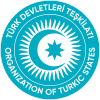| Azerbaijani: | Türk Akademiyası |
|---|---|
| Kazakh: | Túrki Akademiasy |
| Kyrgyz: | Түрк Aкадемиясы |
| Turkish: | Türk Akademisi |
| Uzbek: | Turkiy Akademiya |


May 25, 2010 (Foundation)
August 23, 2012 (Signature of Agreement)
2021 (Ratification of Agreement)
The Turkic Academy, previously known as Turkic World Educational and Scientific Cooperation Organization, or International Turkic Academy is an international institute for Turkology research involving Azerbaijan, Kazakhstan, Kyrgyzstan and Turkey. Hungary and Uzbekistan have observer status.[1][2]
History
[edit]On 3 October 2009 during the Nakhchivan Sumkit, the President of Kazakhstan Nursultan Nazarbayev proposed the creation of an international research center tasked with conducting research on the Turkic world. Next year, on 25 May 2010, the Turkic Academy was founded in Kazakhstan. On 23 August 2012, it was agreed for the organization to become international institution during the second summit of the Turkic Council in Bishkek. Ratification was completed in 2021.[2]
In 2018, Hungary was granted observer status in the academy during the 6th Turkic Council summit.[1] Uzbekistan was granted observer status at the 2022 Samarkand Summit.[2]
The logo of the academy included the English phrase "International Turkic Academy" with Latin script and Old Turkic "𐱅𐰇𐰼𐰜:𐰀𐰚𐰀𐰓𐰢𐰃" in Old Turkic script. This was criticized due to a misspelling in Old Turkic.[3] Old Turkic phrase is changed later to "𐱅𐰇𐰼𐰜:𐰀𐰴𐰓𐰢𐰃", while the term "International" dropped from English part with the 2023 logo.
Academic works
[edit]The Academy published an academic journal "Altaistics, Turkology and Mongolistics" quarterly between 2013 and 2020. There was a news bulletin "Turkic Weekly" published weekly consisting of recent news from Turkic nations between November 2015 and June 2022. The journal "Global-Turk" was published between 2014-2021.[4]
The Academy completed "Common Turkic History", "Common Turkic Literature" and "Geography of the Turkic World" projects in 2023.[5] Also, the academy holds a scientific council annually.
| Date | Location | |
|---|---|---|
| 1 | 5 September 2015 | Astana[6] |
| 3 | 30 January 2020 | Baku[7] |
| 4 | 5 November 2021 | Istanbul[8] |
| 5 | 24 June 2022 | Astana[9] |
| 6 | 28 March 2023 | Bishkek[10] |
| 7 | 1 June 2024 | Shusha[11] |
Administration
[edit]Academy is administered by president and vice-presidents from each member state. Presidency term is four years, with rotating presidency among member states.[12] Second President Kydyrali's term is expanded by four years in 2018.[13] In November 2022, Shahin Mustafayev is appointed as president.[14]
| # | President | Start | End | Scientific Council Presidency | Start | End |
|---|---|---|---|---|---|---|
| 1 | Shakir Ibrayev[2] | 2010 | 2014 | N/A | ||
| 2 | Darkhan Kydyrali | 2014 | 11 November 2022 | 5 September 2015[6] | ||
| 30 January 2020 | ||||||
| 30 January 2020[7] | 5 November 2021 | |||||
| 5 November 2021[8] | 24 June 2022 | |||||
| 24 June 2022[9] | 28 March 2023 | |||||
| 3 | Shahin Mustafayev[15] | 11 November 2022 | incumbent | 28 March 2023[10] | 1 June 2024 | |
| 1 June 2024[11] | incumbent | |||||
External links
[edit]References
[edit]- ^ a b "Hungary is ready for the opening of a new chapter in Hungarian-Turkic cooperation – miniszterelnok.hu". www.miniszterelnok.hu. Retrieved 31 March 2020.
- ^ a b c d "About the Academy | Turkic Academy". turkicacademy.org. Retrieved 29 December 2023.
- ^ ALYILMAZ, Cengiz (2016). "ULUSLARARASI TÜRK AKADEMİSİ VE ALTAY CUMHURİYETİ'NDEKİ ESKİ TÜRK YAZITLARI ALBÜMÜ ADLI ESER ÜZERİNE". A. Ü. Türkiyat Araştırmaları Enstitüsü Dergisi: 657–690. Retrieved 30 December 2023.
- ^ Bıyıklı, Mustafa (December 2016). "TÜRK DÜNYASI ORTAK KURULUŞU OLARAK TÜRK AKADEMİSİ ULUSLARARASI TEŞKİLATI (TWESCO), ROLÜ VE İŞ BİRLİKLERİ". Dumlupınar University Journal of Social Sciences (Special number of Afro-Eurasia): 404–418. Retrieved 26 December 2021.
- ^ "Textbooks on "Common Turkic History", "Common Turkic Literature", "Geography of the Turkic World"". turkicacademy.org. Retrieved 6 January 2024.
- ^ a b "Turkic Council Secretary General Ambassador Ramil Hasanov participated in the 1st Meeting of the Scientific Committee of the International Turkic Academy on 5 September 2015 in Astana". Retrieved 26 December 2021.
- ^ a b "Uluslararası Türk Akademisi Bilim Kurulu Toplantısı Bakü'de yapıldı". www.trthaber.com (in Turkish). Retrieved 31 March 2020.
- ^ a b "TÜRKİYE, ULUSLARARASI TÜRK AKADEMİSİ BİLİM KURULU DÖNEM BAŞKANLIĞINI AZERBAYCAN'DAN DEVRALDI". Retrieved 26 December 2021.
- ^ a b "Minister A. Beishenaliev took part in a meeting of the International Turkic Academy". ОшГУ. Retrieved 29 December 2023.
- ^ a b "The 6th Meeting of the Scientific Council of the Turkic Academy was held in Bishkek". turkicacademy.org. Retrieved 29 December 2023.
- ^ a b "The Scientific Council of the Turkic Academy convened for its regular meeting in Shusha". www.turkicacademy.org. Retrieved 3 June 2024.
- ^ "Türk Akademisinin Kuruluşuna Dair Anlaşma" (PDF). Official Gazette of the Republic of Turkey. Retrieved 31 March 2020.
- ^ "Turkic Academy". Turkkon.org. Archived from the original on 3 December 2022. Retrieved 31 March 2020.
- ^ "Түркі мемлекеттері ұйымының мемлекет басшылары Халықаралық Түркі академиясының президентін тағайындады - TWESCO". twesco.org. Archived from the original on 1 December 2022. Retrieved 1 December 2022.
- ^ "Akademik Şahin Mustafayev Beynəlxalq Türk Akademiyasının prezidenti seçilib". azertag.az (in Azerbaijani). Retrieved 1 December 2022.
